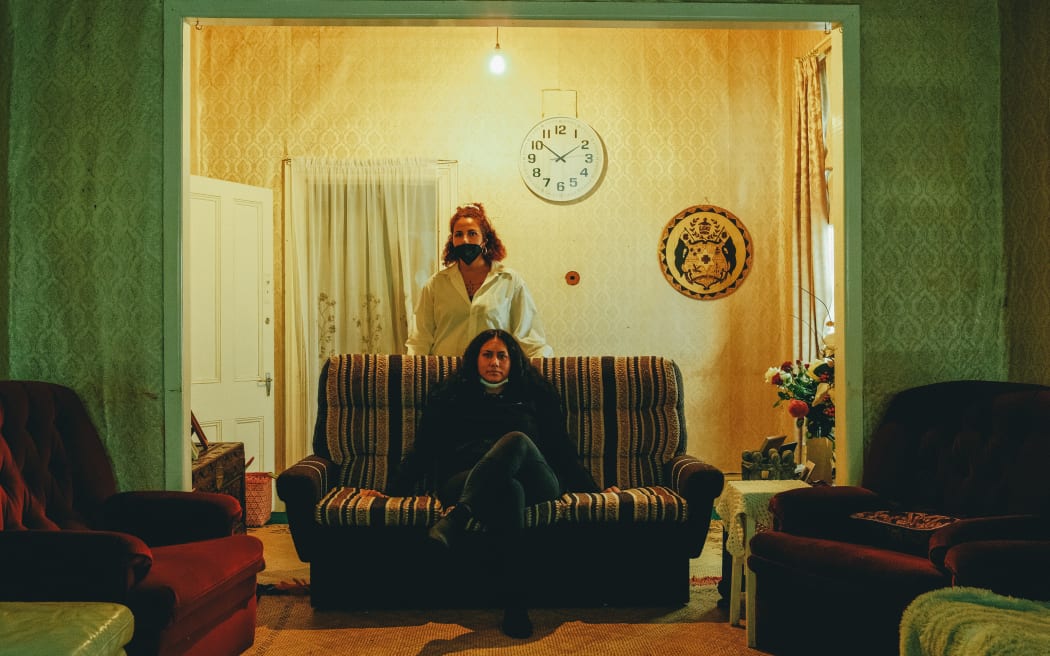New film a ‘love letter’ to urban Pasifika community
Thursday 30 June 2022 | Written by RNZ | Published in Pacific Islands, Regional

From left: Mevia Faletoese, Selu-Kian Leali'ifano-Faletoese, Moevassa Leali'ifano and Nerra Leali'ifano -Tamarua. Photo: Supplied
An all-female film crew is about to launch Still Here, a documentary series intended as a love letter to the central Auckland Pasifika community.
A large cohort of families settled in suburbs like Ponsonby in the 1950s and 60s.
Still Here director Litia Tuiburelevu said she wanted to capture the strength of the families who still live there.
Tuiburelevu said the numbers are dwindling as families are pushed out into the suburbs.
So she has shone a light on the culture that lives on despite entrenched racism and urbanisation.
Moevassa Leali'ifano, who features in the documentary, is Samoan and proud, and is known by many as 'The Queen of Douglas Street'.
"I am like Queen Latifah, I walk up this street, I say hey, I've been here longer than a lot of you around here," said Leali'ifano.
Leali'ifano cuts the grass with a machete, honouring the garden and land her mother loved so much.
"I've been asked by families to sell our house, just imagine the money you make ... oh that's rubbish to me. We don't care if you offered us a billion dollars that is nothing for us," said Leali'ifano.
Back in the day, central Auckland communities were thriving Pasifika hubs, she said.
"We helped each other. It was like our own little south Pacific community. A lot of us went to the same church. We would all be walking along up Ponsonby Road to go to Newton to go to church because we didn't have cars back then," she said.
Her family is still a part of the same church, Pacific Island Presbyterian Church Newton. While the heart of the Pasifika community remains the same, many things have changed.
"Things have just got so expensive, sometimes it just breaks my heart, it was like my people were pushed out," she said.
Capturing the beauty of central city families
It was stories like Leali'ifano's that Auckland University Law research fellow and first time director Litia Tuiburelevu wanted to capture.
"It was in law school when I was learning about housing and institutional racism within housing in New Zealand, when I decided to write an essay about gentrification and the law and racism, focusing on inner city areas and how Pacific families were essentially pushed out by gentrification and urban renewal," Tuiburelevu said.
She wanted to capture the beauty of those families still going strong in central Auckland.

But Tuiburelevu didn't know anyone in the film industry. She floated a documentary idea with Terease Laulu, who took on the role of producer and Ursula Grace from Four in Five films who supported the project.
"It just felt really nice not to have to explain ourselves. The respect and the reverence that we have for these rich and really beautiful stories," Tuiburelevu said.
Terease Laulu said it had been an amazing journey telling stories like Leali'ifano's, one of resilience and culture.
"Being able to work like this with three other very strong wāhine ... it is a very rare sight."
"I really hope that in the future it will spark more change to have more productions that are driven by Pasifika women, being in control of these stories and narratives, particularly Pasifika stories and narratives," Laulu said.
"I refuse to sell the hard work of our families who immigrated from Samoa," she said.
Her parents, like many others, arrived in New Zealand more than 50 years ago.
Still Here will be available to watch on Re: news through TVNZ from 10 July.














































